- Home
- Stephanie Laurens
In Pursuit Of Eliza Cynster Page 36
In Pursuit Of Eliza Cynster Read online
Page 36
“After that, we lost count and just worried.” Cobby pushed through to hug Eliza. “Sadly, our wonderful decoy didn’t work as well as, or for as long as, we’d hoped. Did you have Scrope and his crew on your tail all the way?”
“No — we didn’t see Genevieve or Taylor after we left. Only Scrope and laird.”
“The laird?” Devil turned from speaking with Jeremy. “I’ll be interested in anything more you learned of him.”
Eliza opened her mouth, but a sharp clap drew all attention to Minerva, Duchess of Wolverstone, who had gone inside but now stood at the top of the steps.
“If you want to know all, then I suggest you let poor Jeremy and Eliza gather their wits. If you will all come inside, luncheon is on the table, and after we’ve refreshed ourselves, we can gather in the drawing room and all hear the entire story at once.” Minerva swept the gathering with a sharp hazel gaze. “So no more questions, not until we’re settled in the drawing room.”
Devil turned back to Eliza, but, lips now firmly shut, she just smiled at him. When he frowned back, trying for intimidation, she laughed. “You heard what our hostess decreed. You’ll just have to wait like everyone else.”
Which suited the powerful Duke of St. Ives not at all, but even he wasn’t immune to Minerva’s power. Especially given his own duchess had now fixed her eagle eye on him; with a grunt, he waved Eliza, Meggin, and Cobby on, then crossed to give Honoria his arm.
With Angelica, also keen to hear more, on her other side, Eliza climbed the steps. Looking across, she saw Jeremy flanked by his sister, Leonora, Viscountess Trentham, and his brother-in-law, Tristan, Viscount Trentham. Christian Allardyce, Marquess of Dearne, and his wife, Letitia, flanked Trentham and Leonora respectively.
Eliza’s aunt Helena, Dowager Duchess of St. Ives, and Lady Osbaldestone had gone ahead, each claiming one of Hugo’s arms — and, Eliza had not a doubt, subtly interrogating him; the two grandes dames were the only ones present who would dare defy Minerva’s decree.
They all walked into the cool shadows of the great hall, and Eliza felt the web of her connections — familial, social — click into place once more. As if she’d stepped back into some preordained spot, some already carved niche labeled with her name. And the shape of that niche defined who and what she was …. she wriggled her shoulders, sloughed off the thought, smiled at Angelica, who had looked at her quizzically, and walked on.
She wasn’t the same person she had been, but she didn’t yet know exactly who she now was. She would have to learn the answer, soon, but …
With Minerva in her carver at the end of the table monitoring all conversations, the company restrained themselves, and luncheon passed off quickly and smoothly.
Feeling considerably more refreshed, fortified for what was to come, Eliza took the armchair Royce waved her to in the drawing room, one of a pair he’d set flanking the huge fireplace and facing the long, elegantly comfortable room. The rest of the company disposed themselves on the various sofas, chaises, and chairs, the men spread around the room behind their wives.
All except Royce, who remained between the two armchairs, his back to the fireplace. As Jeremy sat in the other armchair, Royce turned to Eliza and smiled encouragingly. “Why don’t you start with what happened when you left the ballroom in St. Ives House?”
She nodded and began, “I received a note, passed on by one of our footmen.”
Eliza told of her kidnapping, at Royce’s request describing Scrope, Genevieve, and Taylor, then detailing all that had happened from her perspective until Jeremy, Hugo, and Cobby had arrived to rescue her from the basement of the Edinburgh town house.
Royce turned to Jeremy. “How did you learn where she was? Start from when you saw Eliza being whisked past in a carriage up the Jedburgh Road.”
Jeremy nodded and took over the tale, filling in what he’d done while Eliza had been taken to Edinburgh and held at the town house. After outlining how he, Cobby, and Hugo had arranged and executed Eliza’s rescue, he smoothly continued with their journey out of Edinburgh, avoiding all mention of Eliza’s problem with riding, simply stating that soon after leaving Edinburgh they were forced to go on in farm carts, those being the only conveyances available.
When he reached the point of spotting the laird on their trail from the church tower in Currie, he looked at Cobby and Hugo. “I’m assuming your decoy drew Scrope off — we didn’t see him until much later.”
Cobby cleared his throat. “As to that …” He explained what had happened, culminating in his and Hugo’s return to Edinburgh. “But we checked at the stables in the Grassmarket, and they said you’d ridden out, and although a laird — the stableman called him that — had asked after two people who had set out that morning, the stableman didn’t think he was interested in you two — he’d asked after an English young lady and a gentleman.”
Jeremy frowned, then shrugged. “However he did it, he realized we were on that road and came after us.”
“Just the laird?” Devil asked.
Jeremy nodded. “We didn’t see Scrope until later the next day, outside Penicuik. But that’s getting ahead.” He returned to them racing into the Pentland Hills to avoid the laird. He continued in simple, declarative vein, reciting the facts but nothing more. None of the emotions, none of their fears, much less their evolving passions.
Eliza seemed content to let him continue; when he glanced her way, she nodded. When he described their escape from a pistol-waving Scrope in St. Boswells, exclamations abounded. Smoothly, he went on, outlining their subsequent journey, the hurdles of the washed-out bridges, then their last wild race for the border.
His audience sat in absolute, unmoving silence as he recounted their flight from Scrope — no longer merely waving a pistol but actively shooting — culminating in that moment high on the ridge in the Cheviots, and the final, definitive appearance of the laird.
“He’s dead?” Devil sounded incredulous.
“We couldn’t afford the time to stop and look — the weather was closing in. As it was, we made it to Hamish’s farmhouse just as the rain came down.” Jeremy nodded at Hamish. “But Hamish and Dickon went back at first light.”
All attention swung to Hamish as he told what he and his son had seen. As Hamish had predicted, Royce questioned both Hamish and Dickon closely.
Under the cover of the interrogation, Jeremy glanced at Eliza. Their gazes met, held, but he couldn’t tell what she was thinking, how she was feeling, how she now felt about their adventure, about their journey. About what came next.
The sensational end to their flight resulted in considerable discussion over whether the laird was truly dead, and if so, what did that mean? Would they ever learn what the kidnappings had been about — what he’d sought to accomplish through them?
All unanswerable questions, and largely redundant as far as Jeremy was concerned.
But the presence of all the others kept him in the armchair, an effective constraint stopping him from rising and going to Eliza, taking her hand, and slipping away …
Meggin, bless her, noticed that Eliza was tiring; she rose from the chaise nearby, had a whispered conference with Minerva, who nodded, then Meggin went to Eliza and suggested she might like to retire to refresh herself and rest before dinner.
Eliza glanced once at Jeremy, then fell on the offer with an alacrity he shared. Would that he could escape so easily, but he managed an easy, encouraging smile as Eliza’s eyes again met his, then she turned and, with Meggin, left the room.
When Meggin closed the drawing room door behind them, Eliza almost sagged with relief. “Thank you! I’ve never before noticed how noisy such gatherings are — I must be out of practice.”
Meggin grinned. “I have to admit to being a bit overwhelmed myself, but everyone’s been very kind.”
They started toward the wide staircase. “I can’t thank you enough for coming,” Eliza said. “Your children — will they be all right without you?”
“We left the
m with my sister and her husband — they live a little way out of Dalkeith — so my brood will be enjoying themselves hugely with their cousins, I imagine.” Meggin met her gaze as they climbed. “But as Cobby and Hugo were in such a state over not having kept their decoy-disguise for long enough, and were fixed on coming here as they’d intended and confessing all, I decided I needed to be here to support them.”
Eliza smiled. “I’m very glad you came.” It was odd, but she now felt closer — more of a mind, with more shared connection — to Meggin than she did to her own cousins. As if the new her, the her that had been molded and forged through the kidnapping, her rescue, and their flight, had already shifted from the exclusive circles of the London haut ton to … if not the Edinburgh ton, then to some other social sphere.
Some esoteric scholarly social circle where both she and Jeremy could be themselves. Their true selves.
Pondering that insight, she followed Meggin to the room Minerva had had prepared for her.
To find a bath waiting, a footman tipping in the last pail of hot water.
“Oh, joy!” Eliza sighed. “I don’t want to think of how long it is since last I bathed.”
A little maid was waiting with towels and scented soap to assist her out of her gown and help her wash her hair.
Meggin offered to follow the footman out, but Eliza begged her to stay.
They chatted about this and that, a conversation about inconsequential, ordinary, day-to-day things that required no great ingenuity, or subtlety, to maintain.
Then Meggin saw the clock on the mantelpiece, exclaimed at the time, and left to check on Cobby and Hugo.
When Eliza finally rose from the tub and, wrapped in a robe, toweled her hair dry, she felt … like her old self, but not.
She was increasingly certain she could never go back to that earlier self, her previous incarnation. Whatever changes the last week had wrought, they were irreversible.
Her parents had brought a trunk of her clothes; she had the little maid, Milly, lay out one of her own dinner gowns.
“That will be all for the moment, Milly.”
“Yes, miss. Would you like me to come and help you dress, and put up your hair, later?”
“Please.” Eliza smiled as she sank onto the dressing stool and picked up her comb. “I’ll need help to make it presentable. I’m just going to comb it out, then take a nap.”
Milly bobbed. “I’ll be back at the first bell.”
The door had barely shut behind the little maid when it opened again and Heather, followed by Angelica, walked in.
Meeting her sisters’ eyes in the mirror, Eliza immediately knew what they wanted. The truth, the whole truth, and nothing but the truth.
Heather dragged up a chair to one side of the dressing stool; Angelica perched on the end of the stool itself, nudging Eliza with her hip to make room.
“Now,” Angelica said, “tell all. All the stuff you left out downstairs.”
“Did you really walk through Edinburgh dressed in breeches?” Heather pretended to be scandalized, but her eyes gleamed. “I would have given anything not to have to trudge for miles and miles in skirts.”
Eliza nodded and kept combing. “Breeches are much better.” With the comb, she pointed to the riding boots she’d been wearing, set neatly by one wall. “And those helped even more. Riding boots are much better than half boots for walking, even under skirts.”
“When did you stop wearing the breeches?” Angelica looked around. “Have you got them here?”
Eliza explained, knowing full well that her sisters were merely biding their time until they could lead her to the topic they most wanted to discuss.
Eventually, Heather broached it. “Both Jeremy and you seem altogether calm and settled. So what have you decided, you and him?”
Eliza drew a deeper breath, tipped up her chin. “We decided, shortly after we set out from Edinburgh, once we knew we’d be spending days, and nights, alone, that we weren’t going to dwell on the outcome, weren’t going to think or discuss it, not until we’d reached safety.”
Heather frowned. “Why on earth not?”
“I suppose you might say so that we didn’t … prejudice what might evolve, all on its own, between us. We just wanted to let ourselves get to know each other, without preconceived results.”
Heather looked uncertain, but Angelica slowly nodded. “All right. I can understand that. But what about now?”
“Now,” Eliza said, laying down her comb, “he and I need to discuss what we feel, and what we want and how to go about things … but clearly we can’t do that until we get a chance to speak privately, without the entire gaggle of our families looking on.”
“That,” Angelica said, head tilting, “is very true.” In the mirror, she met Eliza’s eyes. “Do you want us to”— Angelica wriggled her fingers, moving them through the air in mimicry of lots of horses —“help matters along?”
Eliza looked into Angelica’s eyes, took in her younger sister’s expression, then looked at Heather, saw the same support in her elder sister’s eyes. “If you can, I’ll be eternally grateful.”
“Consider it done,” Heather said. “I’m sure a word — the right word — in Minerva’s ear, and Honoria’s, will do the trick.”
“Nothing like duchesses to get people moving,” Angelica averred.
Heather tilted her head, her gaze still searching Eliza’s face. “You’ve changed,” she said. “I don’t know exactly how, but …”
Angelica humphed. “Of course she’s changed. She’s found her hero, and if I’m any judge, she’s his heroine.” Rising, Angelica caught Eliza’s eyes in the mirror and grinned. “Which means we should leave so she can get some rest, because she’ll need her strength for tonight.”
Eliza blushed.
Heather saw; her brows rose, but she contented herself with a knowing smile and got to her feet. “Angelica’s right — we’ll leave you. Just promise you’ll call on us if you need any help.”
Eliza felt her smile wobble as she stood. Turning to her sisters, she flung an arm around each of them and hugged. “Thank you.”
They hugged her back, then drew away.
Heather wagged a finger as she turned to the door. “Just remember — you have to send word to us first once you and Jeremy finalize your discussions.”
“Yes, indeed.” At the door, Angelica turned. “No letting Lady O find out about anything first.”
Eliza laughed. “Heaven forbid!”
With a smile, she watched her sisters leave. The smile, and the warmth imparted by her sisters’ tacit approbation of Jeremy, lingered as she walked to the bed, lay down on the counterpane, and closed her eyes.
She wasn’t the same person she had been, but she didn’t yet know exactly who she now was. Perhaps, but she was getting a clearer view of herself with every passing minute.
She’s found her hero, and … she’s his heroine. Angelica had a habit of putting her delicate finger squarely on the heart of things.
Eliza had been searching for her hero for years, and she knew, to her heart, to her soul, that she’d found him in Jeremy Carling.
Totally unexpectedly, but incontrovertibly.
He was hers, and she was his, and in subtle ways that she couldn’t explain yet was nonetheless conscious of, that had changed her. It had changed her view of herself; it had changed how she felt about herself. Their flight, and the way he interacted with her — all the ways in which they connected, shared, and exchanged bits and pieces of themselves — had altered and molded and re-formed her into a lady who was … much stronger and more confident than the young lady she’d been.
As there was no going back, she could only go forward. Forward into their joint future. A future society would demand and insist they share … but there was no reason they needed to allow society to dictate the tenor, the type, of their union.
It had been his farsightedness in suggesting they leave the details of their “outcome” until later, until now, t
hat had allowed them to see what might be, but she was increasingly sure she would need her newfound courage to secure the future as she now imagined it and wanted it to be.
She knew what she wanted with a certainty that previously had never been hers. She’d rarely, if ever, felt so immovably determined.
She’d rarely felt so arrogantly Cynsterish, truth be told.
There was, now she’d looked, no doubt whatever in her mind. She wanted to translate the relationship, the partnership that had evolved between her and Jeremy during their mad flight through a world not their own, onto this plane. She wanted to bring that same closeness, that sharing, that reciprocal reliance, into this, their normal world, and embed it, enshrine it, in their union.
That was what she wanted — the style of marriage she knew they could have, and was absolutely determined they would indeed have.
The only questions remaining were, first, how?
How was she to effect the translation from a life lived under pursuit, to a life lived among the ton?
And lastly, the even more vital question: When all was said and done, now they were back in society’s fold and the ton had once again laid its hands upon them, would he be willing to go along? More, was he, as she was, willing to fight to hold on to the relationship they’d discovered they could share?
Those two questions circled in her brain, around and around, until sleep stepped in and dragged her down.
“What was the damned man looking to achieve?” Devil appealed to the room at large — Royce’s library, to which all the males had escaped and where they now reposed in various chairs, or propped their shoulders against shelves, or, in Royce’s case, prowled restlessly before the long windows — but no one answered.
The “damned man” to whom Devil referred was, of course, the late laird.
Eventually, Royce said, “Once we learn his identity, we might gain some insight. You can leave that to Hamish and me. He’ll track the riders and learn where they left the body. I’ll follow up, without revealing why I’m interested. The bodies were found near enough to my lands, so my questions won’t seem too remarkable. If the man truly was a highland nobleman, then there’s certain to be talk. There’s no way the death of such a man could pass unremarked. One way or another, we’ll follow his trail back.”

 Lady Osbaldestone’s Plum Puddings: Lady Osbaldestone’s Christmas Chronicles Volume 3
Lady Osbaldestone’s Plum Puddings: Lady Osbaldestone’s Christmas Chronicles Volume 3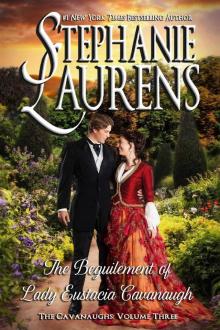 The Beguilement of Lady Eustacia Cavanagh: The Cavanaughs Volume 3
The Beguilement of Lady Eustacia Cavanagh: The Cavanaughs Volume 3 Loving Rose: The Redemption of Malcolm Sinclair (Casebook of Barnaby Adair)
Loving Rose: The Redemption of Malcolm Sinclair (Casebook of Barnaby Adair) By Winter's Light
By Winter's Light Devil's Bride
Devil's Bride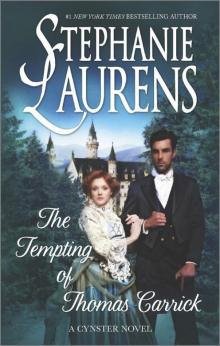 The Tempting of Thomas Carrick
The Tempting of Thomas Carrick![Cynster [22.00] A Match for Marcus Cynster Read online](http://i1.bookreadfree.com/i/03/16/cynster_[22_00]_a_match_for_marcus_cynster_preview.jpg) Cynster [22.00] A Match for Marcus Cynster
Cynster [22.00] A Match for Marcus Cynster All About Love c-6
All About Love c-6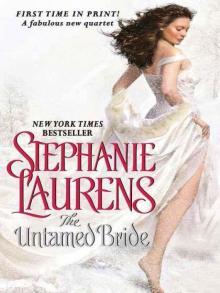 Cobra 01 The Untamed Bride
Cobra 01 The Untamed Bride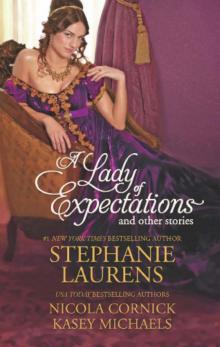 A Lady of Expectations and Other Stories
A Lady of Expectations and Other Stories By Winter's Light_A Cynster Novel
By Winter's Light_A Cynster Novel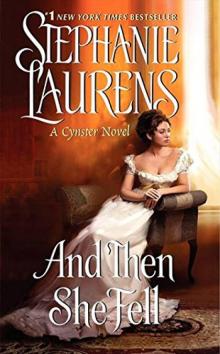 And Then She Fell
And Then She Fell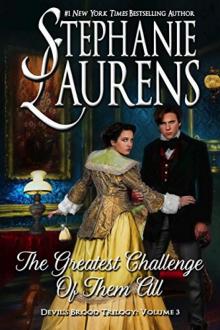 The Greatest Challenge of Them All
The Greatest Challenge of Them All The Edge of Desire
The Edge of Desire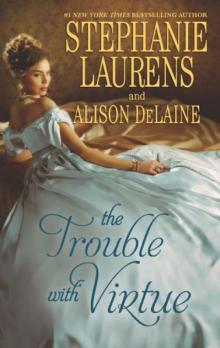 The Trouble With Virtue: A Comfortable WifeA Lady by Day
The Trouble With Virtue: A Comfortable WifeA Lady by Day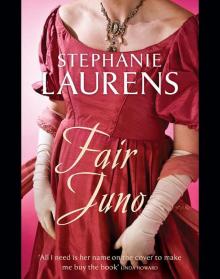 Fair Juno
Fair Juno THE LEGEND OF NIMWAY HALL: 1750 - JACQUELINE
THE LEGEND OF NIMWAY HALL: 1750 - JACQUELINE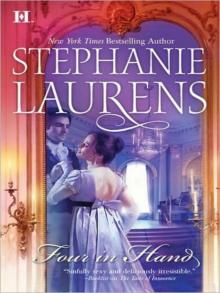 Four In Hand
Four In Hand The Reckless Bride
The Reckless Bride Stephanie Laurens Rogues' Reform Bundle
Stephanie Laurens Rogues' Reform Bundle The Untamed Bride Plus Black Cobra 02-03 and Special Excerpt
The Untamed Bride Plus Black Cobra 02-03 and Special Excerpt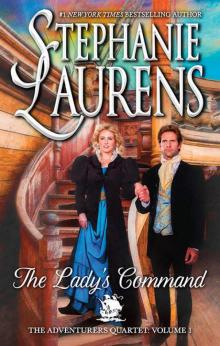 The Lady's Command (Adventurers Quartet #1)
The Lady's Command (Adventurers Quartet #1) The Seduction of Sebastian Trantor
The Seduction of Sebastian Trantor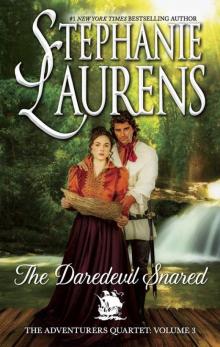 The Daredevil Snared (The Adventurers Quartet Book 3)
The Daredevil Snared (The Adventurers Quartet Book 3)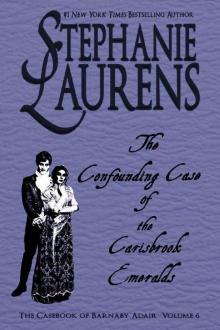 The Confounding Case Of The Carisbrook Emeralds (The Casebook of Barnaby Adair 6)
The Confounding Case Of The Carisbrook Emeralds (The Casebook of Barnaby Adair 6) Lord of the Privateers (The Adventurers Quartet)
Lord of the Privateers (The Adventurers Quartet)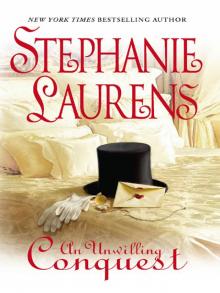 An Unwilling Conquest
An Unwilling Conquest Brazen Bride
Brazen Bride On a Wild Night
On a Wild Night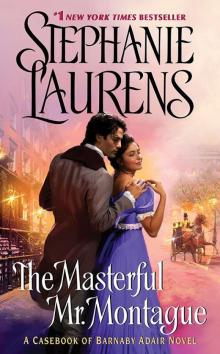 The Masterful Mr. Montague: A Casebook of Barnaby Adair Novel
The Masterful Mr. Montague: A Casebook of Barnaby Adair Novel Lord of the Privateers
Lord of the Privateers Royal Bridesmaids
Royal Bridesmaids Beyond Seduction
Beyond Seduction It Happened One Night
It Happened One Night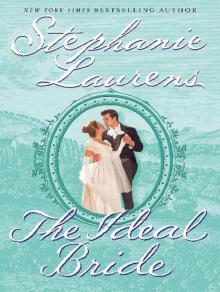 The Ideal Bride
The Ideal Bride The Promise in a Kiss
The Promise in a Kiss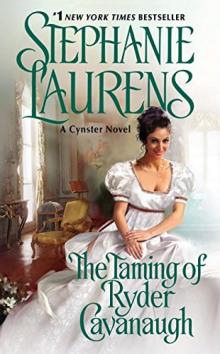 The Taming of Ryder Cavanaugh
The Taming of Ryder Cavanaugh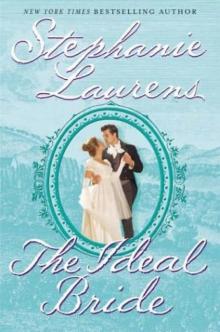 The Ideal Bride c-12
The Ideal Bride c-12 All About Love
All About Love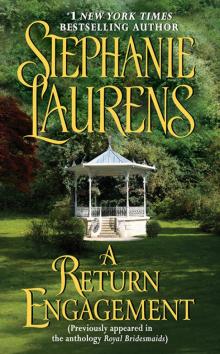 A Return Engagement
A Return Engagement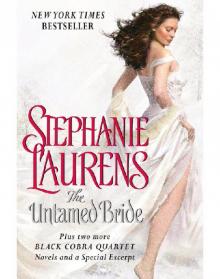 The Untamed Bride Plus Two Full Novels and Bonus Material
The Untamed Bride Plus Two Full Novels and Bonus Material Viscount Breckenridge to the Rescue
Viscount Breckenridge to the Rescue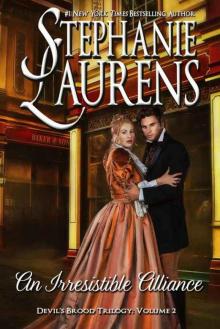 An Irresistible Alliance (Cynsters Next Generation Novels Book 5)
An Irresistible Alliance (Cynsters Next Generation Novels Book 5) The Daredevil Snared
The Daredevil Snared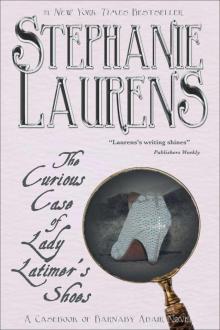 The Curious Case of Lady Latimer's Shoes: A Casebook of Barnaby Adair Novel
The Curious Case of Lady Latimer's Shoes: A Casebook of Barnaby Adair Novel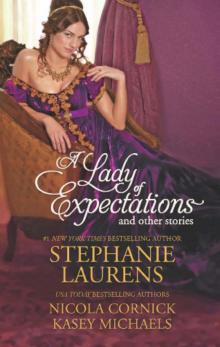 A Lady of Expectations and Other Stories: A Lady of ExpectationsThe Secrets of a CourtesanHow to Woo a Spinster
A Lady of Expectations and Other Stories: A Lady of ExpectationsThe Secrets of a CourtesanHow to Woo a Spinster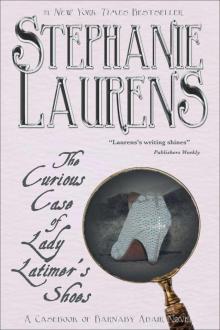 The Curious Case of Lady Latimer's Shoes: A Casebook of Barnaby Adair Novel (The Casebook of Barnaby Adair)
The Curious Case of Lady Latimer's Shoes: A Casebook of Barnaby Adair Novel (The Casebook of Barnaby Adair)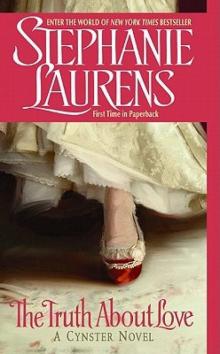 The Truth About Love
The Truth About Love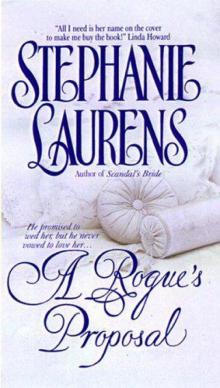 A Rogue's Proposal
A Rogue's Proposal The Elusive Bride
The Elusive Bride The Perfect Lover
The Perfect Lover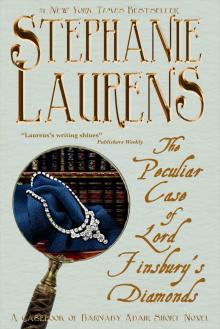 The Peculiar Case of Lord Finsbury's Diamonds: A Casebook of Barnaby Adair Short Novel
The Peculiar Case of Lord Finsbury's Diamonds: A Casebook of Barnaby Adair Short Novel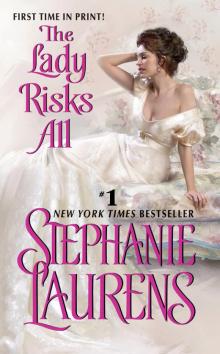 The Lady Risks All
The Lady Risks All The Murder at Mandeville Hall: The Casebook of Barnaby Adair: Volume 7
The Murder at Mandeville Hall: The Casebook of Barnaby Adair: Volume 7 All About Passion
All About Passion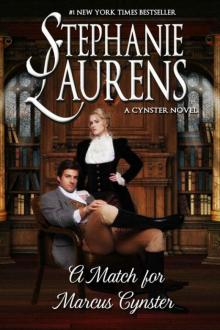 A Match for Marcus Cynster
A Match for Marcus Cynster By Winter's Light: A Cynster Novel (Cynster Special Book 2)
By Winter's Light: A Cynster Novel (Cynster Special Book 2)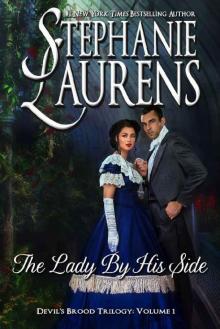 The Lady By His Side
The Lady By His Side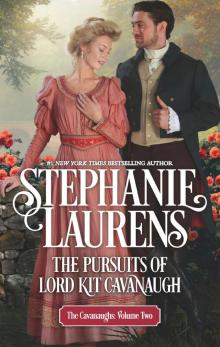 The Pursuits of Lord Kit Cavanaugh
The Pursuits of Lord Kit Cavanaugh Tangled Reins
Tangled Reins To Distraction
To Distraction A Rake's Vow
A Rake's Vow A Comfortable Wife
A Comfortable Wife A Lady of His Own bc-3
A Lady of His Own bc-3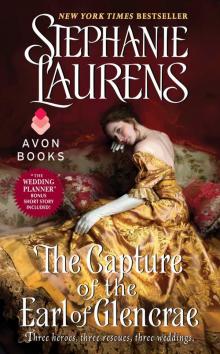 The Capture of the Earl of Glencrae
The Capture of the Earl of Glencrae Scandals Bride c-3
Scandals Bride c-3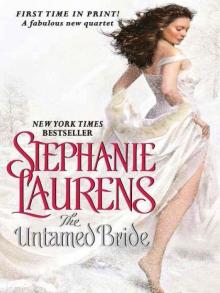 Untamed Bride
Untamed Bride The Brazen Bride
The Brazen Bride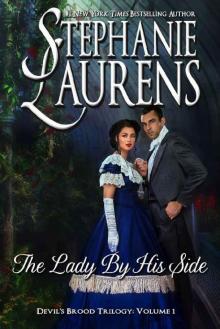 The Lady By His Side (Cynsters Next Generation Novels Book 4)
The Lady By His Side (Cynsters Next Generation Novels Book 4)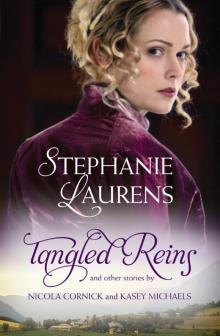 Tangled Reins and Other Stories
Tangled Reins and Other Stories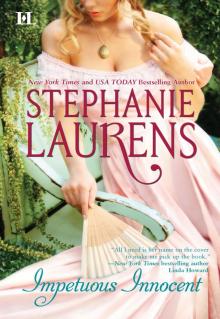 Impetuous Innocent
Impetuous Innocent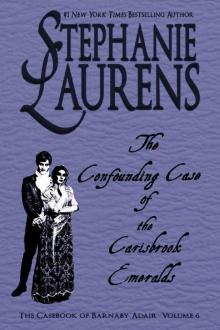 The Confounding Case Of The Carisbrook Emeralds
The Confounding Case Of The Carisbrook Emeralds Stephanie Laurens - B 6 Beyond Seduction
Stephanie Laurens - B 6 Beyond Seduction What Price Love?
What Price Love? A Fine Passion
A Fine Passion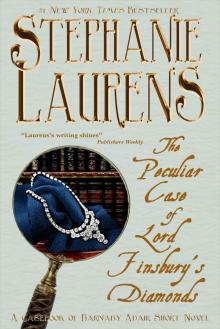 The Peculiar Case of Lord Finsbury's Diamonds: A Casebook of Barnaby Adair Short Novel (The Casebook of Barnaby Adair)
The Peculiar Case of Lord Finsbury's Diamonds: A Casebook of Barnaby Adair Short Novel (The Casebook of Barnaby Adair) Where the Heart Leads
Where the Heart Leads The Designs of Lord Randolph Cavanaugh
The Designs of Lord Randolph Cavanaugh A Secret Love c-5
A Secret Love c-5 On a Wicked Dawn c-10
On a Wicked Dawn c-10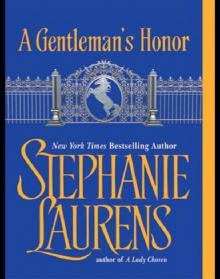 A Gentleman's Honor
A Gentleman's Honor THE LEGEND OF NIMWAY HALL_1750_JACQUELINE
THE LEGEND OF NIMWAY HALL_1750_JACQUELINE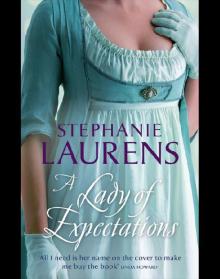 A Lady of Expectations
A Lady of Expectations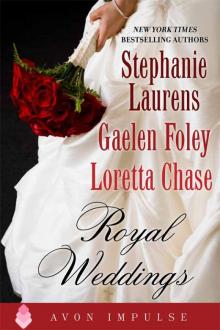 Royal Weddings: An Original Anthology
Royal Weddings: An Original Anthology The Ideal Bride (Cynster Novels)
The Ideal Bride (Cynster Novels) Mastered by Love
Mastered by Love A Buccaneer at Heart
A Buccaneer at Heart Captain Jack’s Woman / A Gentleman's Honor
Captain Jack’s Woman / A Gentleman's Honor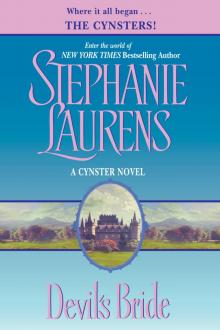 Devil's Bride with Bonus Material
Devil's Bride with Bonus Material A Lady of His Own
A Lady of His Own A Secret Love
A Secret Love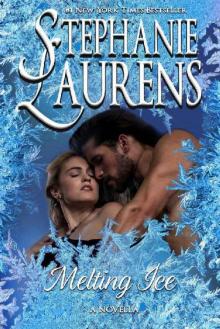 Melting Ice
Melting Ice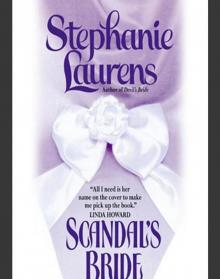 Scandal's Bride
Scandal's Bride Lady Osbaldestone’s Christmas Goose
Lady Osbaldestone’s Christmas Goose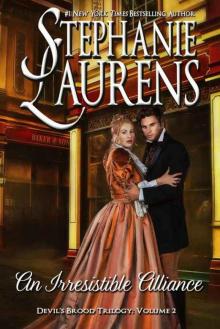 An Irresistible Alliance
An Irresistible Alliance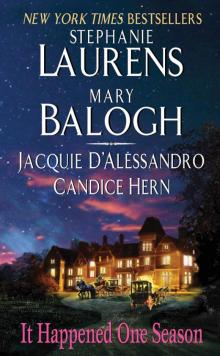 It Happened One Season
It Happened One Season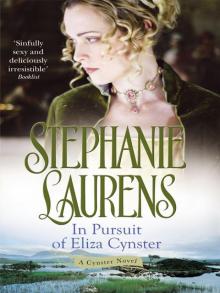 In Pursuit Of Eliza Cynster
In Pursuit Of Eliza Cynster Captain Jack's Woman
Captain Jack's Woman The promise in a kiss c-8
The promise in a kiss c-8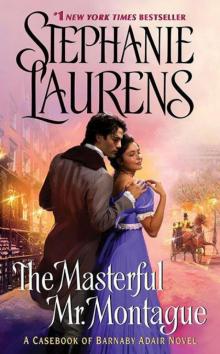 The Masterful Mr. Montague
The Masterful Mr. Montague The Lady Chosen
The Lady Chosen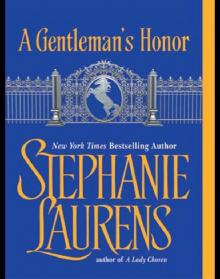 A Gentleman's Honor bc-2
A Gentleman's Honor bc-2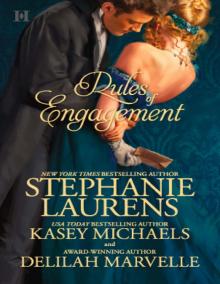 Rules of Engagement: The Reasons for MarriageThe Wedding PartyUnlaced (Lester Family)
Rules of Engagement: The Reasons for MarriageThe Wedding PartyUnlaced (Lester Family) Secrets of a Perfect Night
Secrets of a Perfect Night The Taste of Innocence
The Taste of Innocence On A Wicked Dawn
On A Wicked Dawn The Untamed Bride
The Untamed Bride A Rogues Proposal c-4
A Rogues Proposal c-4 Rakes Vow c-2
Rakes Vow c-2 Devils Bride c-1
Devils Bride c-1 Hero, Come Back
Hero, Come Back On a Wild Night c-8
On a Wild Night c-8 All About Passion c-7
All About Passion c-7